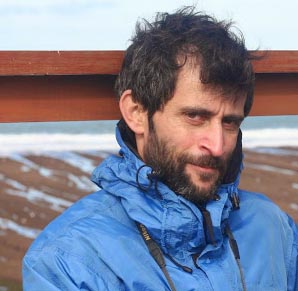Pedro Flombaum
Director CONICET
pflombaum arroba cima.fcen.uba.ar

Cargos Actuales & Títulos Obtenidos
Cargos
Director CIMADirector IFAECI - IRL 3351
Profesor Adjunto,
(Dpto. de Ecología Genética y Evolución/FCEyN-UBA).
Títulos
Doctor en Ciencias Biológicas, Universidad de Brown, EE.UU.
Área de Especialización
Biodiversidad y funcionamiento de ecosistemas
Efectos del cambio climático sobre ecosistemas terrestres y marinos
Publicaciones desde 2010
Carril, A.F.; Flombaum, P.; Menéndez, C.G. (2023). Datos climáticos y prácticas recomendadas para proyectar cambios en la distribución de especies. Darwiniana, nueva serie. 11 (1). 10.14522/darwiniana.2023.111.1094.
Laurent, A.; Godoy, R.F.B.; Cardoso Elias, M.; Franco, G.; Carril, A.F.; Trevisan, E; Flombaum, P. (2023). Extremes in water quality parameters modulated by weather and climate conditions in Ceara State, Brazil. Ecohydrology & Hydrobiology. 23 (4). 10.1016/j.ecohyd.2023.06.004.
Malits, A.; Ibarbalz, F.M.; Martín, J.; Flombaum, P. (2023). Higher biotic than abiotic natural variability of the plankton ecosystem revealed by a time series along a subantarctic transect. Journal of Marine Systems. 238. 10.1016/j.jmarsys.2022.103843.
López Franca, N.; Sánchez, E.; Menéndez, C.; Carril, A.; Zaninelli, P.; Flombaum, P. (2022). Characterization of seasons over the extratropics based on the annual daily mean temperature cycle. International Journal of Climatology. 10.1002/joc.7549.
Ibarbalz, F.M.; Karlusich, J.J.P.; Ayuso, S.V., Visintini, N.; Guidi, L.; Bowler, C.; Flombaum, P. (2022). Phytoplankton DNA metabarcoding in four sectors of the SW Atlantic in the context of the global ocean. Ecología Austral. 32. 10.25260/EA.22.32.3.0.1812.
Visintini, N.; Flombaum, P. (2022). Picophytoplankton phenology in the global ocean assessed by quantitative niche models.. Marine Biology. 169. 10.1007/s00227-022-04080-5.
Tovar, C.; Carril, A.; Fita, L.; Zaninelli, P.; Flombaum , P.; Menéndez, C.; Ruscica, R.; Sörensson, A.; Et all. (2022). Understanding climate change impacts on biome and plant distributions in the Andes: Challenges and opportunities. Earth-Science Reviews. 10.1111/jbi.14389.
Flombaum, P.; Martiny, A.C. (2021). Diverse responses of picophytoplankton lineages to future climate change scenarios. Limnology and Oceanography. 66. 10.1002/lno.11951.
Flombaum, P.; Ibarbalz, F.; Velazco Ayuso, S. (2021). El futuro de un mundo invisible de microorganismos.. Ciencia Hoy. 29.
Visintini, N.; Martiny, A.; Flombaum, P. (2021). Prochlorococcus, Synechococcus, and picoeukaryotic phytoplankton abundances in the global ocean. Limnology and Oceanography. 10.1002/lol2.10188.
Flombaum, P.; Wang, W.; Primeau, F.; Martiny, A. (2020). Global picophytoplankton niche partitioning predicts overall positive response to ocean warming. Nature Geoscience. 10.1038/s41561-019-0524-2.
Flombaum, P.; Aragón, R.; Chaneton, E.J. (2017). A role for the sampling effect in invaded ecosystems. OIKOS. 126. 10.1111/oik.04221.
Brambila, A.; Flombaum, P. (2017). Comparison of environmental indicator sets using a unified indicator classification framework. Ecological Indicators. 83. 10.1016/j.ecolind.2017.07.023.
Flombaum, P.; Yahdjian, M.L.; Sala, O.E. (2017). Global-Change drivers of ecosystem functioning modulated by natural variability and saturating responses. Global Change Biology.. 23. 10.1111/gcb.13441.
Flombaum, P. (2016). The missing link: Microbes in Paris. Cultures. 2.
Nieto, S.; Flombaum, P.; Garbulsky, M.F. (2015). Can temporal and spatial NDVI predict regional bird-species richness? . Global Ecology and Conservation. 3:. 10.1016/j.gecco.2015.03.005.
Cardinale, B.J.; Venail, P.; Gross, K.; Oakley, T.H.; Narwani, A.; Allan, E.; Flombaum, P.; Joshi, J.; Reich, P.B.; Tilman, D.; van Ruijven, J. (2015). Further re-analyses looking for effects of phylogenetic diversity on community biomass and stability. Functional Ecology . 29(12). 10.1111/1365-2435.12540.
Venail, P.; Gross, K.; Oakley, T.H.; Narwani1, A.; Allan, E.; Flombaum, P.; Isbell, F.; Joshi, J.; Reich, P.B.; Tilman, D.; van Ruijven, J.; Cardinale, B.J. (2015). Species richness, but not phylogenetic diversity, influences community biomass production and temporal stability in a re-examination of 16 grassland biodiversity studie. Functional Ecology . 29 (5). 10.1111/1365-2435.12432.
Flombaum, P. ; Sala, O.E. ; Rastetter, E.B. (2014). Interactions among resource partitioning, sampling effect, and facilitation on the biodiversity effect: A modeling approach . Oecologia. 174(2). 10.1007/s00442-013-2775-8.
Cardinale, B.J.; Gross, K.; Fritschie, K; Flombaum, P.; Fox,J.; Rixen, C.; van Ruijven, J.; Reich, P.; Scherer-Lorenzen, M.; Wilsey, B.J. (2013). Biodiversity simultaneously enhances the production and stability of community biomass in experimental systems of primary producers, but the effects are independent Ecology. Ecology. 94(8).
Flombaum, P.; Gallegos, J.L.; Gordillo, R.A.; Rincón, J.; Zabala, L.L.; Jiao, N.; Karl, D.M.; Li, W.K.W.; Lomas, M.W.; Veneziano, D.; Vera, C.S.; Vrugt, J.A.; Martiny, A.C. (2013). Present and future global distributions of the marine Cyanobacteria Prochlorococcus and Synechococcus. . Proceedings of the National Academy of Sciences. 110(24).
Flombaum, P,; Sala, O.E. (2012). Effects of plant species traits on ecosystem processes: experiments in the Patagonian steppe. . Ecology. 93(2). 10.1890/11-0722.1.
Publicaciones anteriores a 2010
Flombaum P. and O. E. Sala. 2009. Cover is a good predictor of biomass in arid systems. Journal of Arid Environments (73):597-598
Flombaum P. and O. E. Sala. 2008. Higher effect of plant species diversity on productivity in natural than artificial ecosystems. Proceedings of the National Academy of Sciences of the United States of America 105(16):6087-6090
Cipriotti P.A., P. Flombaum, O. E. Sala, and M. R. Aguiar. 2008. Does drought control emergence and survival of grass seedlings in semi-arid rangelands? An example with a Patagonian species. Journal of Arid Environments (72):162-174
Flombaum P. and O. E. Sala. 2007. A non-destructive and rapid method to estimate biomass and aboveground net primary production in arid steppes. Journal of Arid Environments (69):352-358